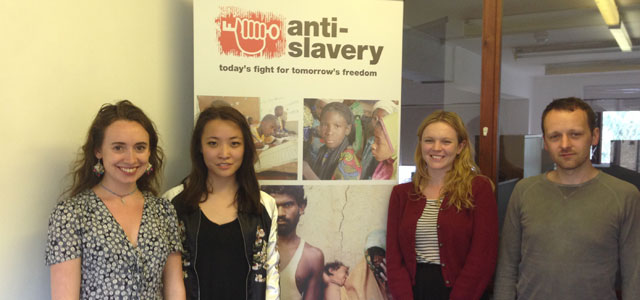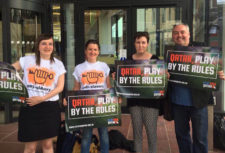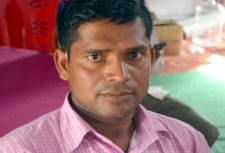Disclaimer: This article is more than 10 years old, and may not include the most up-to-date information or statistics. Please verify information with more recent sources as needed, and if you have any questions contact our Press Office.
4 December 2013
Qatar FIFA World Cup slavery continues despite new evidence and growing pressure.
The exploitation and forced labour of migrant workers in Qatar in the run up to the 2022 FIFA World Cup continues as new evidence of widespread abuse comes to light. An extensive report by Amnesty International and a recent visit by International Trade Union Confederation (ITUC) delegation to Qatar confirmed an alarming situation faced by migrant workers there.
An international outcry followed an investigation into working conditions in Qatar by Anti-Slavery life member Pete Pattisson for the Guardian newspaper that uncovered thousands of Nepalese workers suffering appalling working and living conditions and widespread abuse amounting to slavery.
Many workers have not been paid for months in order to stop them running away, as workers have big outstanding debts in Nepal taken to pay off recruitment agents. Confiscation of passports and refusal to issue ID cards is widespread, reducing the workers to the status of illegal immigrant with virtually no rights.
The workers are routinely made to work many hours in the extreme heat, many of them denied access to drinking water throughout the day. They live in squalid conditions sleeping 12 to a room and get sick from the filthy conditions in the workers’ camps. In the two months there were over 40 deaths reported, mostly from the heart attacks and workplace accidents. Many unpaid workers are forced to beg for food from their colleagues.
The situation is exacerbated by the ‘kafala’, or sponsorship system, meaning that the workers are not allowed to change employers, or even leave the country without their sponsor’s permission, making them completely at their sponsor’s mercy.
Although the Qatari government denied the allegations of forced labour, the labour ministry promised to crack down on companies mistreating workers, shifting the blame for any abuse on to private contractors.
FIFA president Sepp Blatter initially shirked any responsibility for the exploitation of workers on the sites being built for the World Cup. He expressed ‘sympathy’ to families of workers who died but refused to commit to putting any serious pressure on the Qatari government to address the situation and remove the ‘kafala’ system.
However, under growing pressure from campaigners Mr Blatter admitted that abuse of migrant workers in Qatar is ‘unacceptable’, and admitted a responsibility to influence decision-makers in Qatar.
So far however this hasn’t translated into a concrete and meaningful action that could improve the working and living conditions for the migrant workers in Qatar.
Anti-Slavery International has been at the forefront of the debate on the issue of workers’ rights in the Middle East. We have worked on uncovering the plight of migrant workers in Gulf countries for many years, already in 2011 together with ITUC we produced a revealing documentary on this issue.





